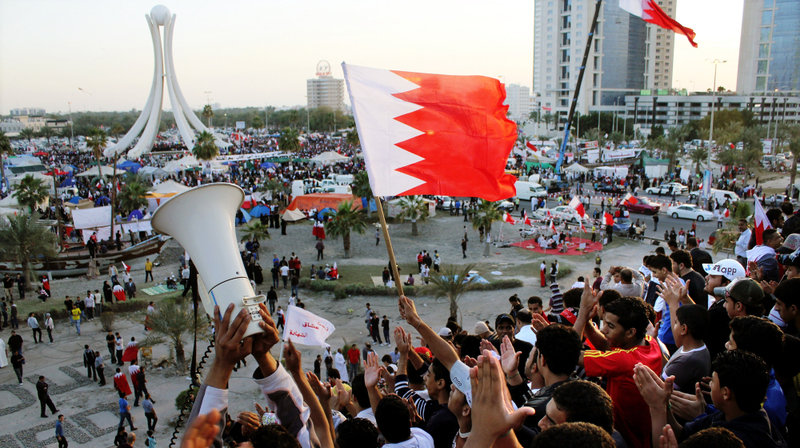Before the peaceful Arab Spring protests in 2011, corruption within Bahrain was both reasonably low and manageable. On the corruption index, the country was ranked 46 out of 180 countries for handling corruption and held a moderate corruption score of 51 out of 100, with a score of ‘0’ being highly corrupt. However, after the 2011 movement was violently suppressed by the Bahraini government, the country has seen a significant rise in corruption. As of 2018, Bahrain is ranked 99 out of 180 countries for handling corruption and its corruption score dropped fifteen points to 36. The drops in both the country’s ranking and score are significant and can be directly attributed to the government crackdown on opposition societies following the 2011 protests.
After the protests forcibly came to an end, the Bahraini government quickly began to suppress all forms of political opposition. By increasing censorship of critical newspapers and eventually suspending all independent papers, imprisoning activists, and dissolving all major opposition groups, the Bahraini government effectively removed all “watch-dog” organizations that would normally keep corruption at stable levels. Bahrain has since begun seeing rapid rises in corruption throughout the private and public sectors of society.
One of the most notable cases of corruption that has occurred in the private sector was the scandal revolving around the American Aluminum company, Alcoa Inc. On 9 January 2014, Alcoa Inc. was charged with bribery by the United States (US) Securities and Exchange Commission (SEC) due to their dealings with smelteries in Bahrain. Alcoa Inc. settled with the SEC by paying 348 million dollars in fines and accepting an admission of guilt. The SEC reported in its investigation that they found Alcoa Inc. was bribing Bahraini officials, including members of the royal family, with roughly 110 million dollars over the course of years, making this one of the most extreme cases of bribery in US history. The SEC found that this extensive corruption occurred because Bahrain houses one of the largest aluminum smelters in the world, and Alcoa Inc. would send their raw materials there for refinement, exposing the company to the high levels of corruption found in Bahrain’s private sector.
Regarding corruption within the public sector, a large majority of corruption in Bahrain comes from the elites within the government. Since the government dissolved all oppositional groups, many elites within the government have seized this opportunity to increase their own personal standing. Led by Prime Minister Sheikh Khalifa bin Salman AlKhalifa, who is the uncle of Crown Prince Salman bin Hamad AlKhalifa, members of the royal family have been preventing all attempts to implement anti-corruption methods, which many believe is an effort to hide their own corruption. As of 2018, while some officials have been questioned, none have ever been brought to court for charges of corruption.
One of the main ways that the Bahraini government has hampered investigations against corruption has been through the handicapping of the National Audit Court (NAC). The NAC was created by the king in 2002 with the intention of cracking down on corruption. The organization publishes annual reports to assess the current corruption issues within Bahraini society. However, due to meddling by elites, the NAC has been stripped of any ability to enforce the laws. The organization has been undermined to such an extent that the previously mentioned Alcoa Inc. scandal was never mentioned in any of its reports, and the NAC is not allowed to investigate the events retroactively. However, recent efforts by Crown Prince Salman suggest that the country may finally begin to seriously deal with matters of corruption.
As rampant corruption continues to be problematic within Bahrain, the situation does appear to be changing. From 2017 to 2018, the country’s corruption handling rank improved from 133 out of 180 to the previously mentioned 99 ranking. This can be attributed to the government updating its penal code on 25 January 2018 to increase the penalties for bribery and extend the Bahraini court’s jurisdictions to try offenders engaged in “international projects” abroad. The updated code now targets employees and public officials, as well as increases penalties. In addition, another force in creating nominal change has been Crown Prince Salman. One of the efforts pushed forward by the Crown Prince has demanded that the cases presented in the NAC’s report be brought to trial under the suspicion of corruption, with a focus on the country’s flour mill companies. By giving the NAC the ability to pursue cases of corruption, Bahrain can begin to make meaningful progress when dealing with corruption in both the private and public sectors.
Through these actions, it appears that the Bahraini Crown Prince does want to implement nominal reforms to begin tackling the pervasive corruption in the country, however, the best way to handle these efforts would be to reintroduce opposition societies and independent media outlets and to release political prisoners and prisoners of conscience. With the help of these groups and individuals, Bahrain and the corrupt elites will be held accountable, returning the country’s corruption levels to the stable levels seen before the 2011 crackdowns.
Ethan Cook is an Advocacy Intern with ADHRB.





